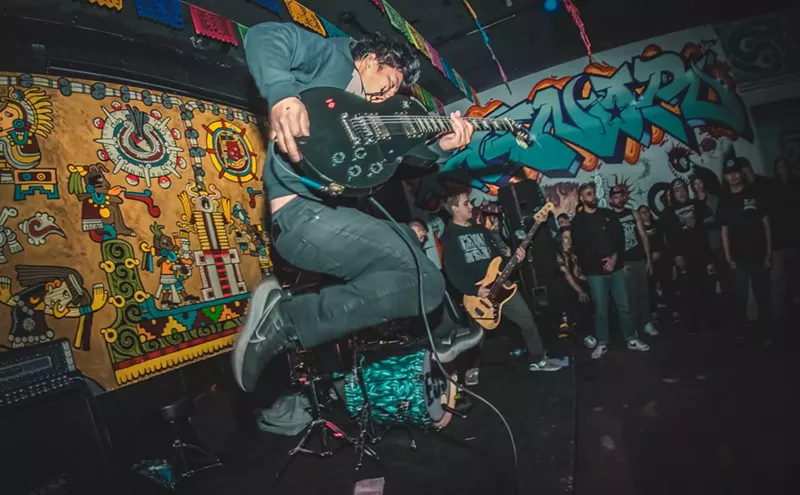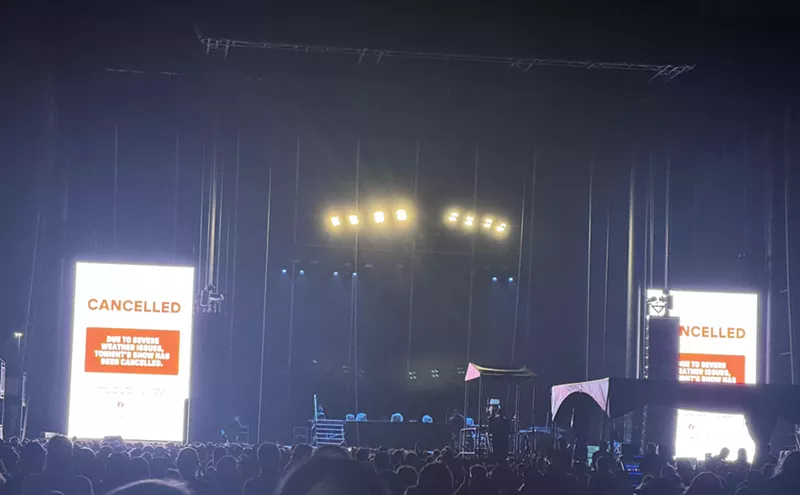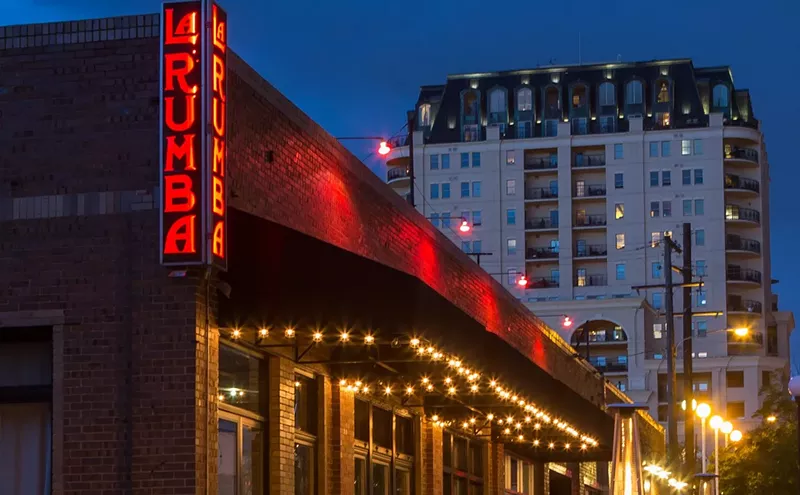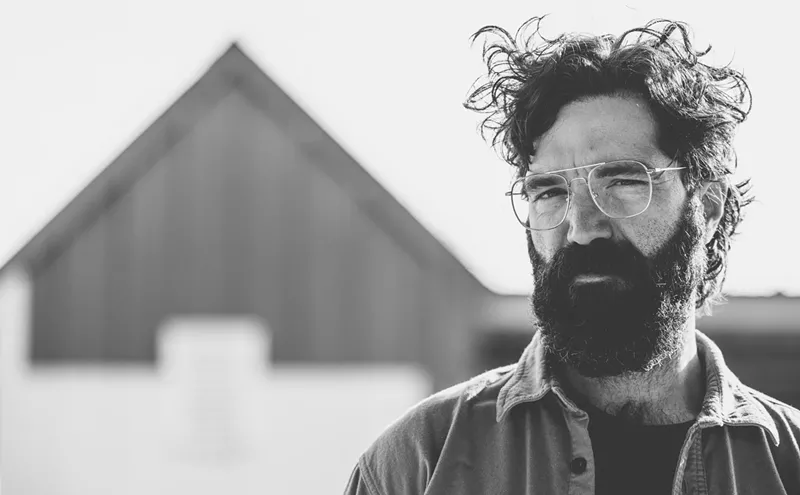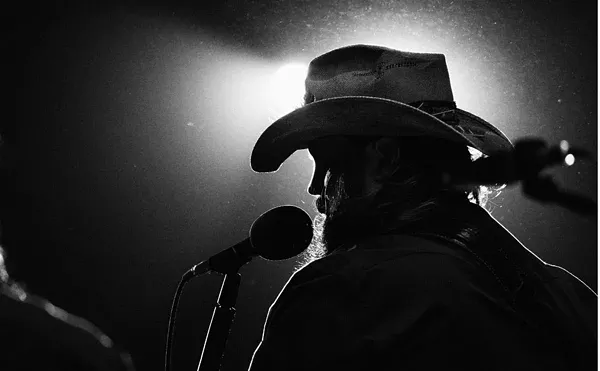Prefuse 73 (due this Wednesday, January 29, at Cervantes' Masterpiece Ballroom) is the alias of Guillermo Herren. Having learned the nuts and bolts of hip-hop production as an employee at a studio in the '90s, Herren created the sort of left-field electronic music that didn't fit in with that style of music nor in the world of hip-hop.
See also: The best concerts in Denver this week
By the time Herren started releasing music as Prefuse 73, beginning with the 2001 album Vocal Studies + Uprock Narratives, Herren had cultivated and developed a musical vision that has since proven influential in its own right as a kind of free-associating soundscape with elements of the experimental hip-hop with an ambient ability to establish a subtle, but strong shifting of moods across a song. We recently spoke with Herren about his tutelage in making beats in the studio for others, how he worked with his many collaborators on his various albums and his love of the early work of J Dilla.
Westword: Did you start making music when you were growing up in Atlanta?
Guillermo Herren: Yes, since I was like six. I started with parentally forced lessons like every child usually does. At least when I was growing up, everyone had to take musical lessons. My mom was just a little harder than the norm. I had to do it from six until I finished high school.
As long as I had stuff like that to do, she was a lot more content with life. If I was busy and I wasn't doing bad things, playing an instrument or playing a sport, would ease her mind, I think. Even though I would be doing bad things. You know, "He's busy doing this productive thing. Making music, playing a sport so he's not getting in trouble."
But yeah, what if I'm sixteen and tripping on acid while I'm playing this sport? She's not going to know that. I did that, though, and I got into tons of trouble, but she had those things to distract her. That was my musical intro.
Like a lot of kids, you did what you had to do to placate your parents and society, and then you did some other silly stuff?
Exactly. You work within the confines.
After you got out of high school, did you get involved in a musical community of any kind in Atlanta before you moved on to other places?
I was really into school at that time. But in high school I was introduced to people making music outside of what we just discussed. There were some guys that I met that were MCs, and they had an SP-1200, an early sampler, and that was really unbelievable to me because I was listening to hip-hop and these dudes had the tool to make it. I started bringing them my records, and everybody kind of took turns making beats. It was really just messing around. I was doing that, but my focus was school.
Later, music came back around again, and it just kind of overtook me. I was working at a studio whose primary clientele was really sort of what would be now considered pre-historic trap music. That was my day job, and it wasn't really fun at all. It really encouraged me to go really left field with my music because I was so bored with people barking orders at me to make them these really boring rap beats.
I wanted to make beats where I went way further than what they were doing. I started off with a mess in the beginning, just all scattered and all over the place, and it sounded awful. Over time I just refined it. I was young, so I'd spend a lot of time on an MPC. That MPC was like my payment for the studio.
I'd do these sessions, and the dude was like, "The MPC is yours when you get past X amount of sessions." This guy didn't want to deal with the obnoxious rap dudes that came in, but I could because I was young and obnoxious myself. Although I was bored, it gave me a chance to learn all of that earlier analog equipment. It was the '90s, and I was lucky, and I am thankful for doing that because I was so young and open.
Do you feel that your mom kind of forcing you to learn multiple instruments had an impact on the music you made later on?
Definitely. All that stuff is intertwined. And the amount of pressure she put on me to practice and just do it every fuckin' day, all the time, would lead me to, at a young age, to experiment with an actual instrument. If there was a piano or whatever, I would noodle around. You come up with stuff, and you say, "Hey, I really like playing this instrument when it's not under the conditions and confines of sheet music that somebody else wrote. It's all about your form with instruments -- it's the way that you approach and play -- more than it is just letting loose when you're taking lessons and being instructed. You can use the tool the way it's supposed to be used, or work against them and make them sound the way that you want them to sound.
Everybody could make the same song if they just use presets and work with the way the program manual tells you to use it. My whole take on that is, "fuck the manual, that shit is boring. I'd rather just learn as I go and learn from friends." I miss out on a lot of stuff, though. I used to have the patience to actually read a manual and copy it down and get super into it. But there's just so many things out there, and I'd rather just pick up tips and approach it a different way, I guess. I think that is the long form answer about my mom forcing me to take lessons to now.
When you were working at that studio, you acquired a good bit of hardware even beyond the MPC?
I did. My set-up grew over time. Of course, they had stuff in the studio that belonged to the studio. But I had my own stuff, and it was not very fidelity friendly. A laptop or a Mac, to me, back in the day, was like a Bentley. I had a PC, and it was cheap, and I had to finance it and pay for it monthly. But I needed some kind of computer, and I used those old school PC programs, like Sound Forge or Cool Edit, basically, which were on your computer or your friend had it, just to record on to.
It didn't sound great. But over time, I got the Bentley, and everything got a little bit easier. You made do with what you had. When I got the Mac, I went to Pro Tools. It made sense for a really long time, but now I go between that and Ableton for recording stuff for different reasons. It depends on what style, what I'm mixing, what is the fidelity factor and does it matter. I just switch between those two.
When you perform live do you use Ableton? Do you use a combination of that and hardware?
Man, I used to make it really difficult on myself and bring all analog gear. I don't know what kind of stupid statement I was trying to make by doing that, but I guess I wanted to keep things as true to how the studio was as possible. But then I caved in. Everything is smaller and lighter and easier to go through customs with. Why fight that, man? Bringing two hardware sampler/sequencers and a hardware keyboard is ideal, but when you're traveling along you get extra luggage fees and all this stuff, it makes sense when you're on a tour and you're in a van and playing a lot of dates.
But when you're playing fly-in shows, and it's not for a particularly long amount of time, it doesn't make as much sense. So when I play alone it's definitely more lighter stuff. Ableton has definitely been something I fought for so long not to use, but now, it's a godsend. It just makes things a lot easier when you're alone. I used to have a band that toured with six people in it. But that came to an end. It came to an end like a lot of things in the industry came to an end -- it cost money. With a six-piece band, you don't really come home with much at the end of a tour.
How did you get connected with Warp Records?
I released my first record, and it was horrible. I had this old, old sampler, and I did one side all ambient, and the other side was really old school kind of, I don't know, beats but it...is nothing I want to listen to or think about. But somehow, through the wire, they got that, and it sparked interest. I honestly didn't care whether they liked it or not because I didn't like it. There was somebody in the office talking to me way back then about it because they were stoked on it. I was like, "Well that's awesome. Thank you so much for the compliment on that shitty ass record."
Then a few years later, when I had refined Prefuse to the point where I wanted it to be, a couple of friends that were close to people at Warp, they gave it to them. I just didn't care. Warp wasn't to me what it was to other people. I don't come from a techno background or a rave background. I knew what they were, and I knew what Aphex [Twin] was, and I was warming up to Boards of Canada's first record.
But I really liked Broadcast, and they only had an EP out at that time on Warp. I was like, "Well, yeah, fuck, I will do this. I'm down." They called me, and the next thing, I was in London meeting up with them, and it was pretty fast and crazy. Ever since then, time has sort of flown by. All this stuff, ups and downs, since the very beginning of doing music on my own for a living and taking it seriously, age goes to the side and I'm fixated and focused on music.
It's weird, I'm coming from two different eras of music being a certain way. I like both ways, but when it began, there were still empires and whatnot, and music was un-fuck-withable. But part two, that empire crashed and economized in a completely different way.
Recently you started your own imprint. Why did you start Yellow Year, and why did you call it that?
I had a label before through the 2000s called Eastern Development, and we put out bands. When we stopped doing that, I wanted to have something of my own for special projects in lower numbers. I've never really been a numbers dude. I don't care about Twitter, Facebook numbers, sales numbers -- all that stuff is so irrelevant. The point is to do things not in a self-absorbed way but for yourself in a freedom way. No matter how left field it is, at least five hundred copies are going to make it to those five hundred people that are going to like it, as opposed to doing a grand scale album release.
Yellow Year is sort of an inside term that my friend Dan [Lopatin] from O.P.N. [Oneohtrix Point Never] came up with. I was actually going to call a project that, but I ended up calling a label that. It's not really a deep story, it was just brainstorming. It's alliteration. I have a project, Savath y Savalas, and people ask me what that is, and I tell them, "I don't know." I never knew. It's just because it just worked, and I loved what you could do with it in a visual sense.
How did you come to work with Claudia and Alejandra Deheza before they formed School of Seven Bells?
Claudia is my baby's mom. Alejandra is her twin, of course. That's a quick way to answer that question. We're no longer together, but we were together a long time before Seven Bells. When that happened, that's right when Seven Bells started doing things and at their most happening.
On Surrounded By Silence, especially, you've worked a number of other musicians. How did you go about facilitating working with so many people? Was that a time you could send files to people, or did you go about that differently.
Actually, that's a good question. That was sort of in that middle point where people weren't really sharing files much as far as a collaboration is concerned. I mean, you could do it. Even though the span is not, in a historical sense, not very long since that record was made, but most of the time, you would hang out with the person while it happened, and even if that didn't happen, there was some physical presence involved. It didn't happen over the internet so much. There were still actual phone calls and not emails so much. There was that, but it was fifty percent less Internet intensive, as opposed to the way things work now where you can be like, "Bam!" and collaborate.
I have friends who collaborate that can't stand doing Internet, file sharing collabs at all. They hate it. I honestly don't really care either way. I like the idea to come up and to come about as easy as possible, and I think it's best when you're there mixing it together and making the form of the song. It's cooler when you can do that with another person, once the idea is formed. It's always good to say at the end of the day that you were in the room.
For Preparations, with Interregnums being the second side, why did you want to make that sonic division on that album?
The flip side is just the samples and the framework without the beats. It's the same songs, just the beat-less version. I later recorded that whole side in Poland with an orchestra, and that will come out maybe this year. I've been sitting on it for a while. But it's good.
There is obviously an ambient element to your music, but there's also a jazz element. Were there particular artists in those realms of music that informed what you do?
It's hard to say. I'm influenced by so much stuff, it's really hard to call who does what. I hear so many influences in everything.
Ambient is more popular now, but, say, twenty years ago, most of what you heard about that term was associated with Brian Eno and, more then modernly, Aphex Twin. Did any of that stuff impact you?
I really liked stuff that was on Kompakt. I listened to a lot of that stuff back in the day. A lot of the ambient stuff on Meego or ambient-esque like Christian Fennesz and Oval. I don't know if I would call it more complex ambient or processed music.
Jazz is so broad is there a particular style or artist that struck you?
I just really like the stuff that was more spiritually-driven. Like late '60s and early '70s. It was really deep and exploratory, as opposed to by-the-numbers jazz. I have respect for that, but Alice Coltrane and Pharoah Sanders and all those people that worked together? That stuff is just really interesting to me. It's really mysterious.
It was highly experimental for that time. I don't think people were really happy about it because they were really introducing all these different instruments. People were just like, "This is bullshit. All these world instruments in our stuff?" They definitely didn't want electric instruments. It's crazy that people were so against it. Like purists.
I can remember in early Prefuse days when hip-hop purists would dog the shit out of me. They weren't happy at all. Electronic people weren't happy at all because it was too hip-hop. I'm talking the general public, message board shit and the equivalent of what a YouTube comment is now -- mindless rants.
You could tell these hip-hop people and these electronic people were both on the same page for once. They both didn't like me for different reasons. Because of the purity. It wasn't pure-bred electronic music. It wasn't tricky enough. It wasn't computered out and tech enough. The hip-hop dudes were like, "This shit is too tricked-out and fucked-up. It's like noise, it's atonal, I don't get it."
Then all of a sudden, people came around to it, and then everything seemed fine. Over time, people were experimenting a bit more. To this day, music sort of takes things from the past and builds upon it and becomes a new thing all the time. Some things get stuck, but there's a whole lot of music that moves forward constantly on one theme, and people get used to it. They weren't at one time.
It's interesting because it seems like your music made an impact on Flying Lotus, and he was very much a disciple of J. Dilla -- who was considered too weird for mainstream hip-hop people at one time, and now he's considered a visionary, as he should. It's not just this weird thing these days.
That's true. It's not weird anymore. When I first started doing this shit -- don't get me wrong -- there was plenty of hip-hop that bugged out people, like the Def Jux stuff, at the time, and the Cannibal Ox record. All those monumental records from that time, those are pretty weird for a straight boom-bap backpacker dude to listen to until they came around to it.
I remember back in the day they got turned on to Dilla because of Donuts. I remember when he was just releasing these singles as Frank n Dank. I remember purists hated that because it was so minimal. They did this straight sort of Primo style. They didn't like the off-time kick and snare and bass lines and just a couple of sounds. And I loved it. I thought it was so revolutionary, and I thought it was some next shit.
I remember people being in my house and literally saying, "That dude is killing hip-hop, man." And I was just like, "Shut the fuck up! Why are you taking that stuff so seriously?" I'm not going to name any names, but it was a rapper, a working rapper, and I had my two turntables and two Dilla records set up I had been playing, and he looked at them and went, "Garbage." "You're crazy dude, just because you don't want to change your shit doesn't mean it's garbage."
Stuff like Ruff Draft has that instrumental side that is so rich for reinterpretation, and his music was like that -- it wasn't limited and was so flexible and not trapped as much by time and place.
Yeah. Just because he came with stuff that was minimal doesn't make it any less hard. It was dirty; it was clean, I don't know how to explain it. It's just good shit. I like Donuts as much as the next dudes, but I like those earlier records for where they stood in time and what they did at that time. I can go back to those just as easily and say, "This is the shit."
Follow @Westword_Music



